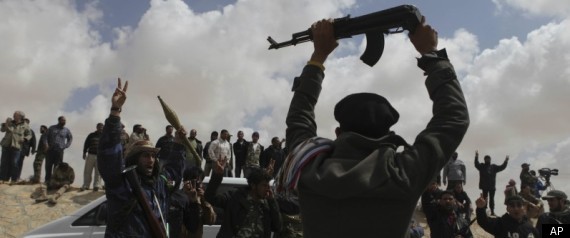UN Hopes To End Conflict With A 'Unity Government' In Libya
Libya Civil War

NEW DELHI: The United Nations has presented a draft proposal for the establishment of a Libyan unity government, hoping to bring an end to the conflict that has plagued the country since the removal of Muammar Gaddafi in 2011.
The plan was unveiled in Morocco and puts forth terms of a truce and disarmament to warring factions competing for political power in the troubled country. UN special envoy Bernardino Leon called on Libyans to back the proposal. “Today, the people of Libya have their eyes on this gathering, on you, in the hope that you'll save your country and your people from protracted conflict," Leon told Libya’s two rival governments. "I am full of hope that this draft represents a fair and reasonable way forward," he added.
The UN plan calls for a one-year unity government and reaffirms that the parliament elected in 2014 is the legitimate legislative body. Currently, Libya’s internationally recognised government is based in the eastern port of Tobruk. The rival faction, the Islamist-dominated General National Congress is a 1000 km to the west in Libya’s capital city of Tripoli.
The conflict in Libya has acquired a new context as the Islamic State -- using the chaos in the country to its advantage -- established a foothold. At the time of writing, the US confirmed that the group had kidnapped 86 Eritrean Christians from a people-smugglers' caravan.
The group has claimed a string of attacks on embassies, released a video purportedly showing the killing of up to 30 Ethiopian Christians in Libya, released a video allegedly showing the beheading of 21 Egyptian Coptic Christians in Libya, claimed an attack on the luxurious Corinthia hotel in central Tripoli -- amongst other incidents of violence.
However, despite these attacks, it is not clear how much influence the group holds. For one, the Islamic State has seen success by capitalizing on the Shia-Sunni conflict in Iraq and Syria, and sectarian tensions of this scale do not exist in Libya. The crisis in Libya is more directly concerned with the local power vacuum, and this context has led to many on social media wondering whether the group is really responsible for all the attacks it has claimed.
Nevertheless, the string of attacks have changed the already fraught political landscape. The execution of Egyptian Christians drew a response from Egypt in the form of bombings targeting Islamic State camps, training sites and weapons storage areas in Libya. This response could escalate Egypt’s role in Libya. In a nationally televised speech, Egyptian President Abdel Fattah Al Sisi said, “ Egypt “reserves the right to respond in the way and timing it sees fit for retribution from these killers.” Al Sisi has also previously said that Libya’s internal struggle poses a security risk to Egypt, and has thrown his political support behind Libya’s internationally recognized government, which has unsuccessfully tried to overthrow a rival Islamist government that controls the capital, Tripoli.
(Libya’s fraught political landscape. Source: BBC).
Egypt is already engaged in a fight against Islamic militants in the Sinai peninsula -- with Ansar Beit al-Maqdis (ABM), that has carried out a series of attacks on security forces in the region, having pledged allegiance to the Islamic State. “After entrusting God we decided to swear allegiance to the emir of the faithful Abu Bakr al-Baghdadi, caliph of the Muslims in Syria and Iraq and in other countries,” the statement by the group said. The statement went on to ask Egyptians to rebel against "the tyrant," President Abdel Fattah el-Sisi, declaring that “we will continue to fight the army until the day of judgment.”
Ansar Beit al-Maqdis are not the only group to pledge support to the Islamic State. IS’ followers includes the city of Derna in Eastern Libya, a Jordanian Salafi group, a handful of Tehreek-i-Taliban Pakistan (TTP, or the Pakistani Taliban) leaders, a mosque in Denmark, a man in Texas, and even Boko Haram in Nigeria.
However, the Islamic State’s growing influence in Libya is of significance because it could prove to be a model for expansion for the militant group -- one that is based on taking advantage of political contexts characterised by infighting and paralysed governments.
Given this context, a resolution to the conflict in Libya is of utmost importance.



